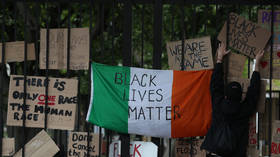US Supreme Court refuses to hear challenges to qualified immunity doctrine shielding police from lawsuits

The US law doctrine, protecting police and other public officials from lawsuits, is not going to be reexamined by the country’s Supreme Court. The decision comes amid nation-wide protesting against police brutality.
The US Supreme Court issued an unsigned order on Monday announcing its decision to decline hearing any further cases that seek to reconsider the doctrine of ‘qualified immunity’. According to the doctrine, a police officer cannot be personally liable – and thus cannot receive a civil suit – unless their actions violate “clearly established” law or court rulings. Conceptually, the idea was to shield government officials from frivolous legal action, especially when it comes to cases in which police must make split-second life-or-death decisions. The framework has been criticized for setting the bar too high for proving police officers’ personal liability for their actions.
Also on rt.com US Supreme Court hands conservatives devastating losses on LGBT, guns & immigrationA Reuters study has found that in practice the doctrine has created hurdles for police accountability, as courts usually dismiss police misconduct lawsuits based on the fact that there exists no prior court decision under identical circumstances.
The ongoing George Floyd protests, sparked by an African American man dying while being arrested by Minneapolis police, have drawn considerable public attention to the doctrine. That incident prompted calls to reform the police, with many arguing that qualified immunity should be abolished.
Thus, the libertarian US Representative Justin Amash proposed the ‘Ending Qualified Immunity Act’. A Senate resolution calling for the elimination of qualified immunity was later introduced by Democratic Senators Kamala Harris, Ed Markey and Cory Booker.
Also on rt.com Black people are ‘terrified’ of US cops who can pull trigger & walk free due to ‘qualified immunity’ – activists to RTThe reform has found little to no support among Republicans, though. Senator Tim Scott made headlines after saying that ending qualified immunity would be a "poison pill” for his party, as it would do away with support from police unions and antagonize the significant pro-police portion of the electorate.
Even among the nine Supreme Court justices, there is no unanimity when it comes to the subject. Two of them – Sonia Sotomayor and Clarence Thomas, who supposedly represent opposite sides of the American political aisle – have previously tried to get the court to reexamine the doctrine.
Justice Sotomayor has previously called the doctrine a “one-sided approach” which transforms qualified immunity into “an absolute shield for law enforcement officers.”
Justice Thomas also dissented, saying, “I continue to have strong doubts about our ... qualified immunity doctrine.”
With the current Supreme Court closing the book on the subject, it is legally now only up to Congress or the president to push for any change on this matter.
Like this story? Share it with a friend!














